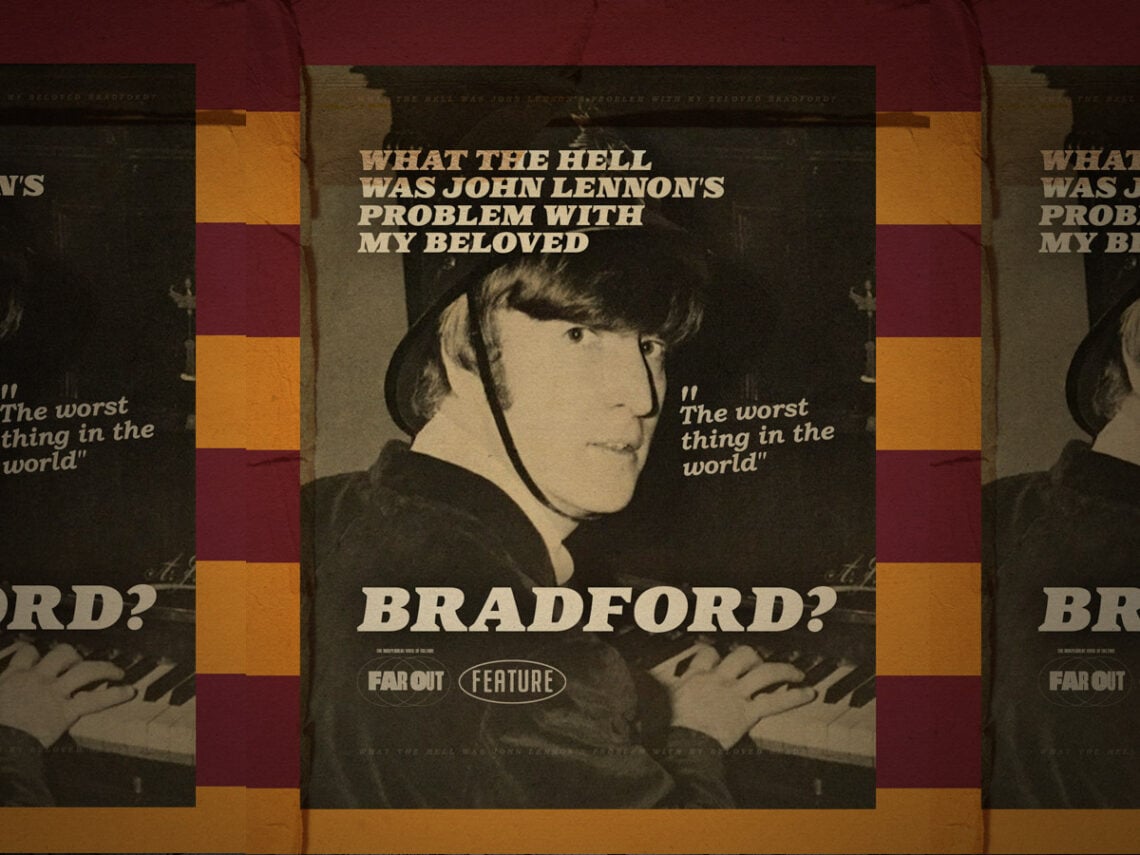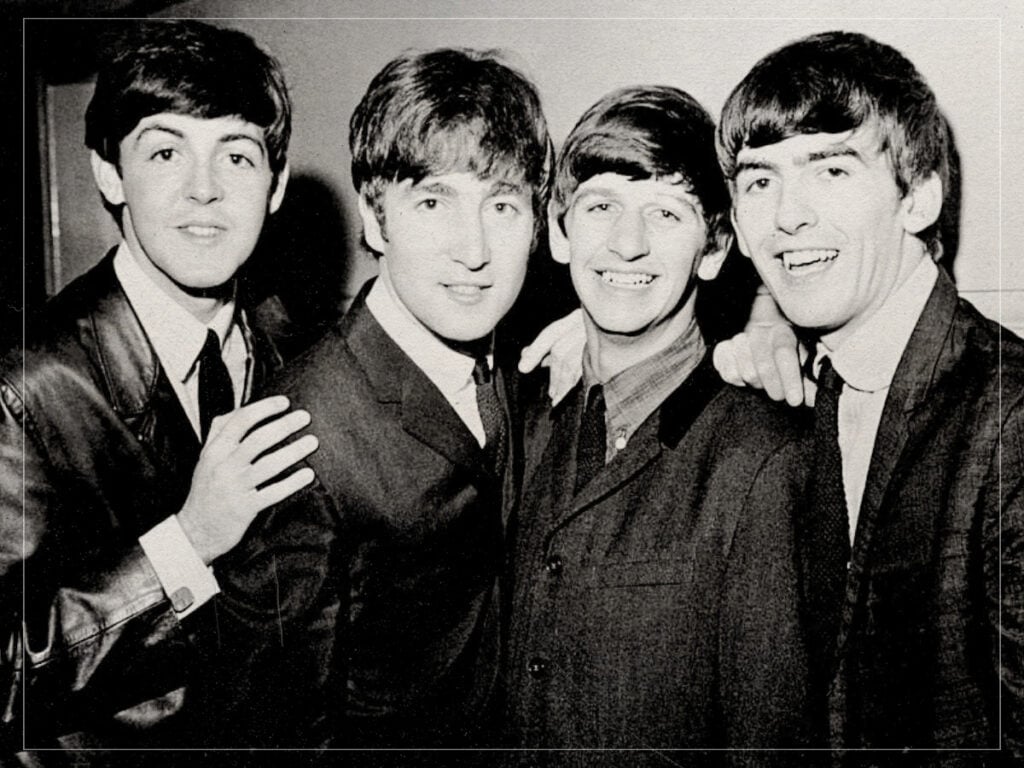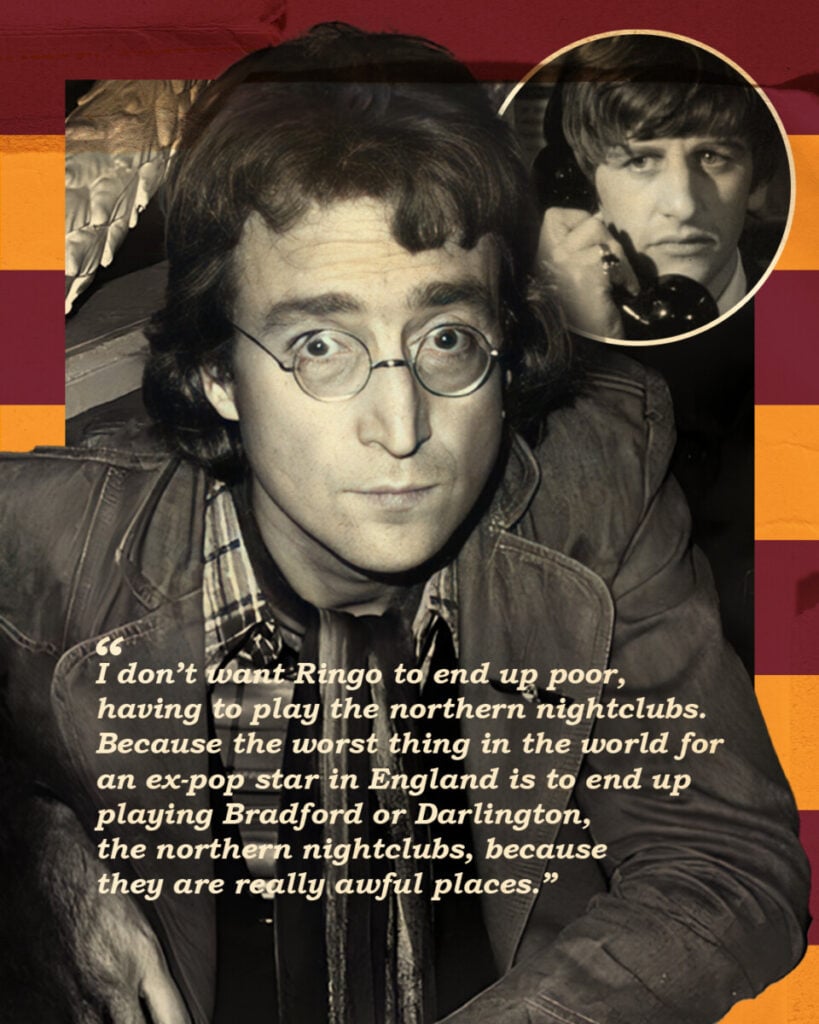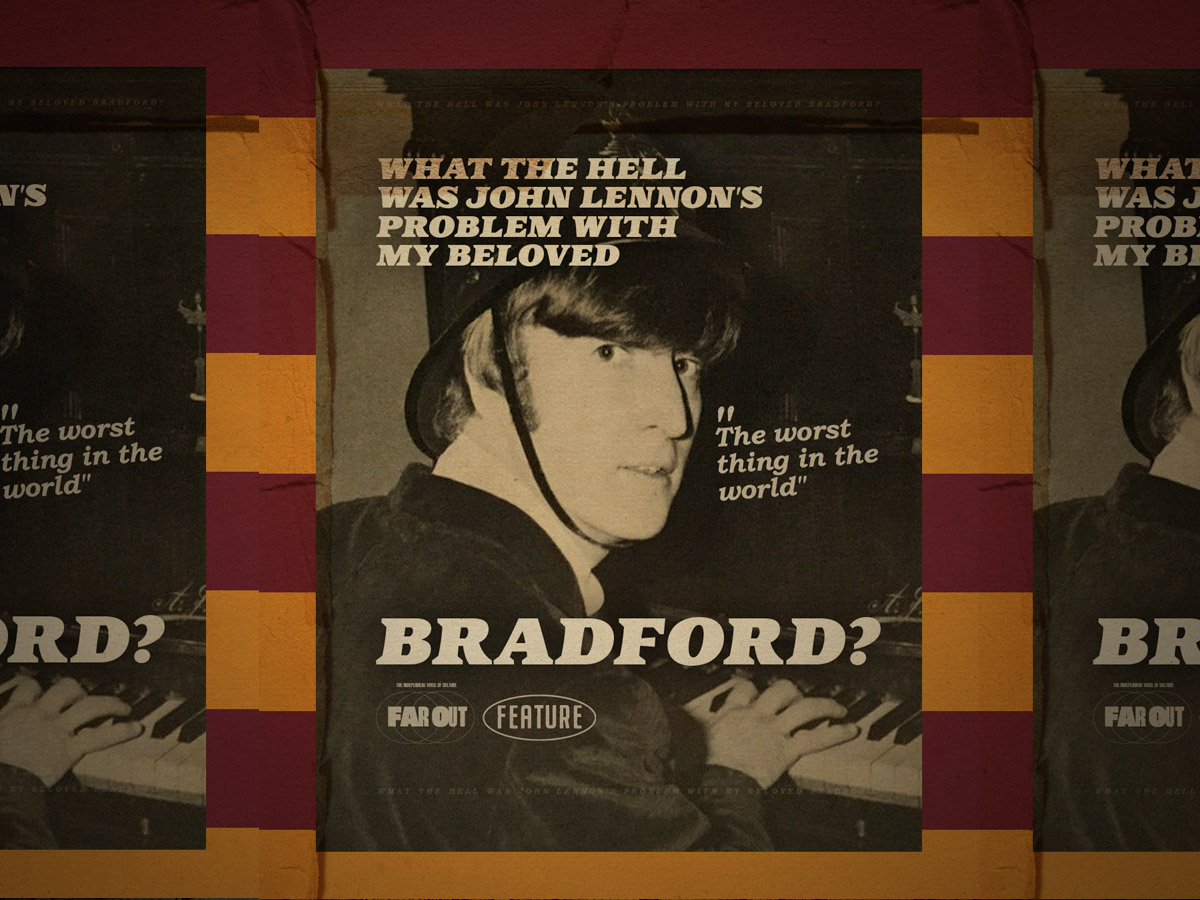
(Credits: Far Out / Bradford Timeline)
Thu 2 October 2025 15:30, UK
Once the wool capital of the world and the current cultural capital of the United Kingdom, Bradford is a city I feel privileged to call home; for all its flaws and negative portrayal in the press, this ‘city of dreams’ certainly has a lot to offer.
So why, then, did John Lennon seem to have such a vendetta against it?
Perhaps more so than any of his Beatles comrades, Lennon was always unapologetically outspoken. From his apparently outrageous claim that the Merseyside ‘Mop Tops’ were “more popular than Jesus” during the height of Beatlemania, to his subsequent years spent lying in bed in New York City advocating for peace and love. Seemingly, though, that hippie-ish attitude did not extend to the songwriter’s view of proud northern industrial cities, like Bradford.
Growing up in the City of Culture, I fondly remember driving past the then-derelict Gaumont Theatre (now newly refurbished as Bradford Live) to be regaled with stories from my grandmother, about how she had seen The Beatles perform there back in the 1960s, when they were third on to the bill to Helen Shapiro.
Imagining my own grandmother as one of the many screaming teenagers standing outside the grandiose domes of the Gaumont is a story that holds a very special place in my heart, but it seems Lennon never shared the same fondness for that 1963 gig as Margaret.
In total, The Beatles performed at the Gaumont in Bradford on three occasions, all of which formed landmark nights in the history of the world’s biggest band. In addition to playing with Helen Shapiro in 1963 – the opening night of the band’s first nationwide tour – they also played the inaugural show of their 1964 tour at the theatre (on Lennon’s 24th birthday, no less), as well as a preview of ‘Christmas Show’ later that year.
 The Beatles in 1963, around the time of their first visit to Bradford. (Credits: Far Out / Alamy)
The Beatles in 1963, around the time of their first visit to Bradford. (Credits: Far Out / Alamy)
Even today, if you talk to Bradfordians of a certain generation, it doesn’t take long before the exclamation, “The Beatles played here, you know”, presents itself. In fact, Gail Moss, the daughter of the hotel owners who put the band up on Lennon’s birthday back in 1964 once told local rag, Telegraph and Argus, that he “despite his toothache, was still the life and soul of the party, told endless jokes and did a brilliant imitation of a pompous Yorkshire mill owner – he was a great mimic”.
Yet, despite this city of boars and bantams welcoming the Fab Four with open arms during the early days of their path to world domination, Lennon had nothing but disparaging things to say about Bradford in the years that followed.
For instance, when Paul McCartney visited Bradford University with Wings back in 1972, although their scheduled show never ended up taking place, Lennon dismissed his former bandmates’ new horizons. “I couldn’t do what Paul did with Wings and just turn up at Bradford University and play. It’d have to be something more organised than that,” he declared.
It doesn’t stop there, either. During one interview with Ray Connolly, from Lennon’s country estate in Berkshire, he once again cast scorn upon the north of England. “I don’t want Ringo to end up poor, having to play the northern nightclubs,” he said. “Because the worst thing in the world for an ex-pop star in England is to end up playing Bradford or Darlington, the northern nightclubs, because they are really awful places.” Really, John, the worst thing in the world?
It is worth remembering, at this point, that during The Beatles’ world tour of 1966, the band were subject to riots at virtually every turn. They were sent death threats in Japan, and were chased out of the Philippines by a marauding dictator and his military goons. Yet, the absolute worst thing ‘working class hero’ John Lennon can imagine is playing to, what, adoring fans filling the seats of a beautiful, historic theatre in Bradford? Give your head a shake.
 (Credits: Far Out / Alamy / YouTube Still)
(Credits: Far Out / Alamy / YouTube Still)
Lennon is not the only person to have ever criticised this city. Those criticisms, however, tend to arise from ignorant, lazy and – let’s be frank – racist folks, who unfairly equate the downturn the city faced in the wake of post-industrialism with a rise in immigration from South Asia, Eastern Europe, and the Caribbean. While those criticisms are certainly more infuriating than anything Lennon had to say, it must be said that he witnessed Bradford at one of its most prosperous periods, when it was at its most swinging and Billy Liar-esque. So what on earth was his problem?
Perhaps Bradford was merely a prominent name that Lennon could pluck out of the ether to discuss the north in general, maybe he couldn’t abide referring to a bread roll (correctly) as a teacake, or maybe those three shows at the Gaumont Theatre hadn’t been quite as magical for The Beatles as they were for my grandmother. Either way, his repeated bashing of the city forms one of the oddest trends in Lennon’s extensive interview archives.
Who knows, Bradford has changed so much over the past five decades that maybe Lennon’s view of the woollen city would be different were he still around. It was good enough for JB Priestley, David Hockney, Frederick Delius, and Sir Fred Hoyle, even if Lennon couldn’t see its appeal.
From the moors of Haworth to the mills of Saltaire and the old Gaumont building, which stands proud once again in the city centre, Bradford is a sprawling, diverse landscape made up of countless different cultures existing side by side on back-to-back terracing. Despite its reputation, it truly is a city of dreams and, regardless of Lennon’s views, I know where I’d rather be.
Related Topics
The Far Out Beatles Newsletter
All the latest stories about The Beatles from the independent voice of culture.
Straight to your inbox.

